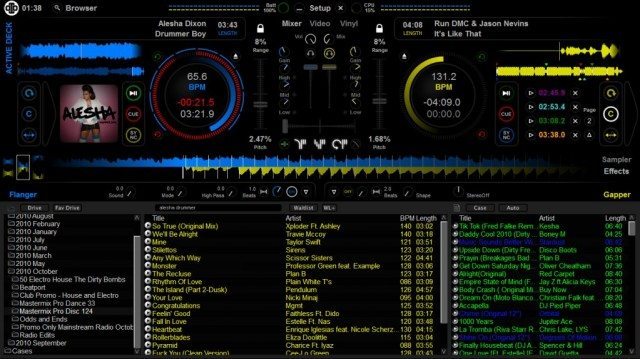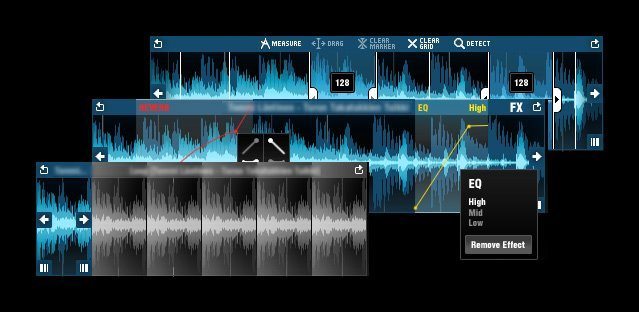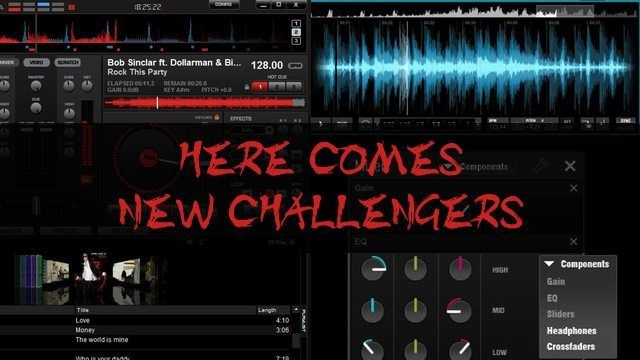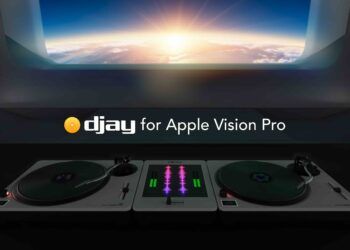In the past few weeks, we’ve seen evidence that Serato and Traktor are about to have some serious competition on their hands in the coming months. We’ve seen this happen in the past, namely with Deckadance and Torq making major inroads with new feature sets that the Big Two lack, but neither of those have gained enough traction to be taken seriously.
Virtual DJ
Atomix’s Virtual DJ has been a player for quite some time – but despite it’s ability to perform and a strong set of features (skinable interface, on-the-fly key detection, overlapping waveforms, support for multiple soundcards, unlimited decks, a strong VJ interface, a comprehensive scripting language and VST support on Windows), it’s still widely and unfairly considered by many DJs and industry folks to be a bit of a joke.

That being said, Atomix is setting the stage for yet another attempt to being taken very seriously in the market by buying out adionSoft, the group behind another small-time DJ application, djDecks. djDecks is very similar in terms of features and appearance to VirtualDJ, and on the surface it would seem like a merging of these two softwares would be about as interesting as mixing mineral water with tap water. But Atomix announced that the engineers have been working together to merge the codebases of the two products from the ground up, giving them a chance to create a product that addresses the key complaints of both (stability and audio quality are the more common complaints that we’ve heard and read about) and potentially a stronger feature set than any other DJing software on the market. Virtual DJ 8 will arrive within a few months (odds are good we’ll see it at NAMM?), but according to Atomix, it won’t be officially released until “testers aren’t able to find any single bug left.”
Buying another company who is doing what you’re doing can be a great path to software success – if you doubt that, look at how Apple’s purchase of NeXT Software paved the way towards the massive success of OS X by using technologies that NeXT had been developing for years.
Our one major suggestion for Atomix is that in this process of rebuilding Virtual DJ, hire a great interface designer to make the default skins for the product. Skins are great- but an intelligent, great-looking interface that is there from the first time it boots could make this new version something that users rave about.
The One
Just one day after Atomix dropped their big news, the team behind “The One” DJ software sent out a message to everyone who signed up for their beta announcing that their product will be divided into a “Core” edition and a “Premium” edition, the former being launched in the next few months, and the latter following later in 2012.

On their Facebook Page, they’ve started to reveal some more specifics of the Core edition, and it continues to look like an incredibly robust and innovative product. Besides the features that we saw in their promo video last month, like on-the-fly resizing of the interface and completely customizable modular interface, they’ve announced on-the-fly sequencer-like editing within the player deck.
The other promising thing that we’re seeing on their Facebook Page is a high level of interaction and communication with their fans, which is a great sign for anyone who has ever asked for anything (feature request, support tickets) from Serato and Native Instruments. Hopefully, if The One takes off, it will not lose this sentiment – we’re firm believers that strong user communities are the best resource and greatest asset for any product.
The Rumble
Serious competition for the Big Two might just be what the DJ software industry needs – a kick in the pants to keep developing products and finding new solutions. We don’t expect any major coups, but as these minor players draw attention and eventually users, we’re excited to see how it all plays out.
What do you expect/desire from this “next wave” of DJ softwares? Do VDJ8 or The One stand a chance against the industry heavyweights? Let us know in the comments below.
Further reading: Read our Traktor vs. Serato vs. Ableton vs. VDJ article that we wrote earlier this year.









